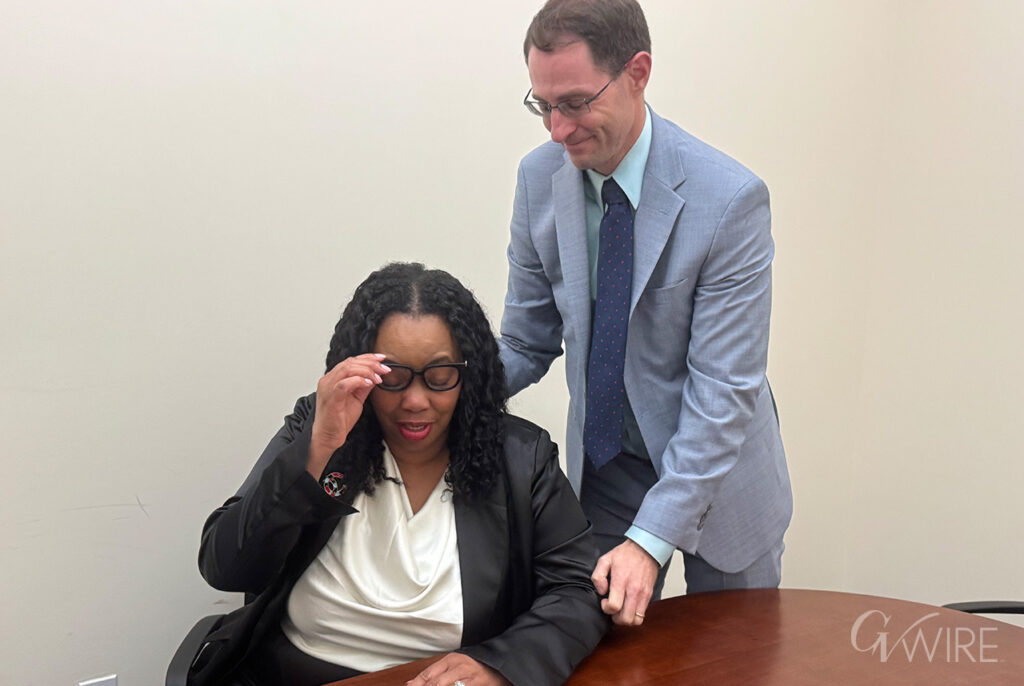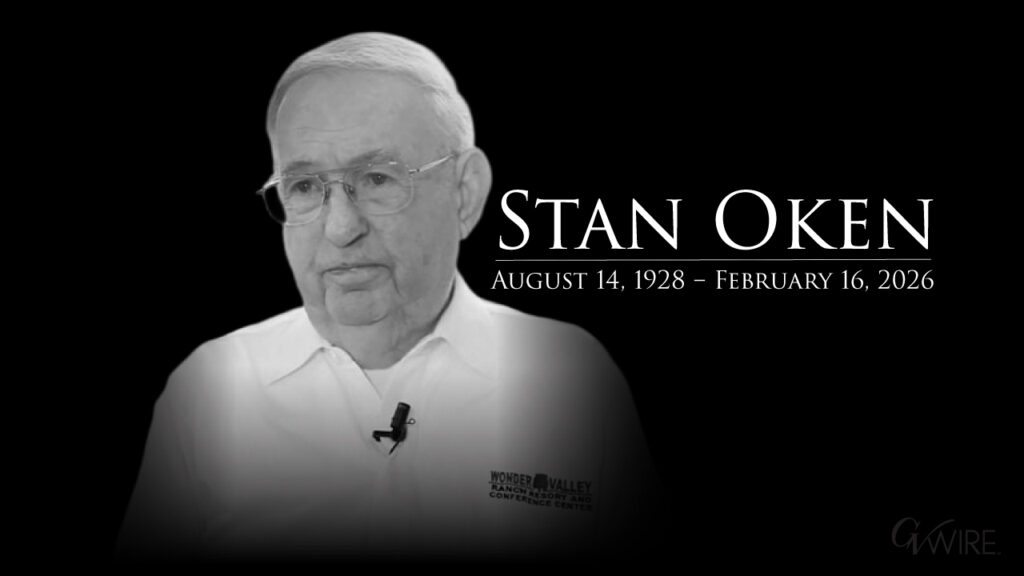Sen. JD Vance (R-Ohio), the Republican vice presidential nominee, speaks at Donald Trump’s campaign at a horse farm in Big Rapids, Mich., on Aug. 27, 2024. Vance once championed a little-noticed 2017 Heritage Foundation report that proposed a sweeping conservative agenda to restrict sexual and reproductive freedoms and remake American families. (Jamie Kelter Davis/The New York Times)

- JD Vance endorsed a 2017 Heritage Foundation report promoting conservative values and restricting reproductive rights and IVF.
- The report criticized IVF, supported abortion restrictions, and suggested economic hardship drives work, reflecting conservative policies.
- Vance wrote the introduction, praised the report, but denies involvement in its views. He supports IVF publicly.
Share
|
Getting your Trinity Audio player ready...
|
Years before he became the Republican vice presidential nominee, JD Vance endorsed a little-noticed 2017 report by the Heritage Foundation that proposed a sweeping conservative agenda to restrict sexual and reproductive freedoms and remake American families.
In a series of 29 separate essays, conservative commentators, policy experts, community leaders and Christian clergy members opposed the spread of in vitro fertilization and other fertility treatments, describing those treatments as harmful to women. They praised the rapidly expanding number of state laws restricting abortion rights and access, saying the procedure should become “unthinkable” in America. And they cited hunger as a “great motivation” for Americans to find work.
Vance, then known as the author of a bestselling memoir, became a champion of the project. He wrote the introduction and praised the volume as “admirable,” and was the keynote speaker at the public release of the report at Heritage’s offices in Washington.
Related Story: JD Vance: A Millennial in Age, but Not in Spirit
Report Released Months Before Trump Became President
The report was released just months after Donald Trump became president, as social conservatives were laying the foundation for an aggressive agenda restricting sexual freedom and reproductive rights. Those policies became a hallmark of the Trump administration and Vance’s political career.
Taken together, the pieces in the report amount to an effort to instruct Americans on what their families should be, when to grow them and the best way to raise their children. Authors argued in the 2017 report that women should become pregnant at younger ages and that a two-parent, heterosexual household was the “ideal” environment for children.
“The ideal situation for any child is growing up with the mother and father who brought that child into the world,” wrote Katrina Trinko, a conservative journalist, in an essay detailing the “tragedy” of babies born to single mothers.
Although Vance did not address in detail the specific issues of fertility treatments, abortion rights or marriage, the broad vision expressed in the report comports with some of the views he has expressed about American families.
Related Story: JD Vance Outlines His Campaign’s Strategy Against Harris
He has been an ardent opponent of abortion rights, saying he wanted to protect life “from the date of conception.” During his Senate race in 2022, he promised to oppose legislation codifying the right to marriage for same-sex couples. He has stressed the importance of having children, saying not doing so “makes people more sociopathic.”
And in a comment that prompted a wave of outrage among liberal and independent women, he criticized prominent Democrats as “childless cat ladies” — a claim he later dismissed as a “sarcastic remark.”
Vance’s campaign neither defended nor disavowed the opinions expressed in the report, saying he had no role in editing the essays and “did not have any input on the commentary.”
“Sen. Vance has long made clear that he supports IVF and does not agree with every opinion in this 7-year-old report, which features a range of unique views from dozens of conservative thinkers,” said Luke Schroeder, a spokesperson for Vance. “It’s bizarre that The New York Times is writing an entire piece attacking Sen. Vance for the views of other individuals.”
Heritage Foundation Says Vance Had No Involvement
The Heritage Foundation also said Vance had no involvement with the policy ideas included in the report, but declined to offer an opinion on the content.
“Sen. Vance had no role in producing or approving the contents of the 2017 Index of Culture and Opportunity, outside of writing the introduction,” said Noah Weinrich, a spokesperson for the organization.
In his introduction, Vance argued that economic struggles were inextricable from what he saw as cultural decay, suggesting that fixing the state of American life required not just proposals about trade, jobs and education but an embrace of conservative social values that would define the nation’s families.
“Culture, in other words, must serve as the beginning of a conversation, not the end of one, and proper conversation about culture will never be used as a weapon against those whom Christ described as ‘the least of these,’” he wrote in the foundation’s Index of Culture and Opportunity report. “It will be a needed antidote to a simplistic political discourse.”
Related Story: Tech Bro Elegy: How Did JD Vance Get Here?
One of the essays takes a deeply skeptical view of IVF and other fertility treatments, arguing that they cause women to be “lured into the belief that they can have children whenever they are finally ready.”
The piece casts women as turning to fertility treatments as “magic pills” to delay motherhood for professional advancement rather than as expensive last resorts for couples desperate to have a child. It also refers to egg-freezing, the medical procedure through which eggs are harvested, frozen and stored for later use, as a “scheme.”
“We need to stop practices that may bring harm to others: the children born from high-tech pregnancies as well as the women who are exploited for their healthy reproductive capacities,” writes Jennifer Lahl, an anti-abortion advocate, who founded the Center for Bioethics and Culture, a group that questions the use of fertility treatments.
Trump Wants IVF Treatment Free for All Americans
Trump said on the campaign trail last week that he wants to make IVF treatment free for all Americans, a proposal that faces a steep — if not impossible — climb through Congress and the federal government to becoming law. Vance, who has expressed support for IVF, defended that position on the trail but offered no specifics on how Trump would fund his plan.
Another set of pieces reiterate long-held conservative economic views, including eliminating regulations on businesses, cutting federal spending, expanding charter schools, increasing work requirements for welfare programs and voicing opposition to programs that offer government assistance for Americans to buy or rent homes.
The report was published as Vance was dipping his toe into politics and was famous for his memoir. His beliefs on specific issues were relatively unknown, and his endorsement of the Heritage report offered an early declaration of his socially conservative values.
“Two of the biggest factors driving regional differences in upward mobility are the prevalence of single-parent families and concentrated poverty, indicating that both family and neighborhood structure matter in the lives of our nation’s working class,” he wrote in the introduction.
Related Story: JD Vance: A Millennial in Age, but Not in Spirit
In recent weeks, Trump has gone out of his way to distance himself from the Heritage Foundation and the group’s Project 2025 effort, a policy blueprint for the next Republican administration that has become a major Democratic attack line.
Vance’s participation in the foundation’s Index of Culture and Opportunity report offers a reminder of the yearslong ties between him and the conservative think tank — connections that deepened in the years that followed.
In June, Vance announced that he wrote the foreword to a new book by the Heritage Foundation’s president, Kevin D. Roberts, Project 2025’s principal architect. Publication of that book has since been delayed until after the election.
–
This article originally appeared in The New York Times.
By Lisa Lerer/Jamie Kelter Davis
c. 2024 The New York Times Company




















